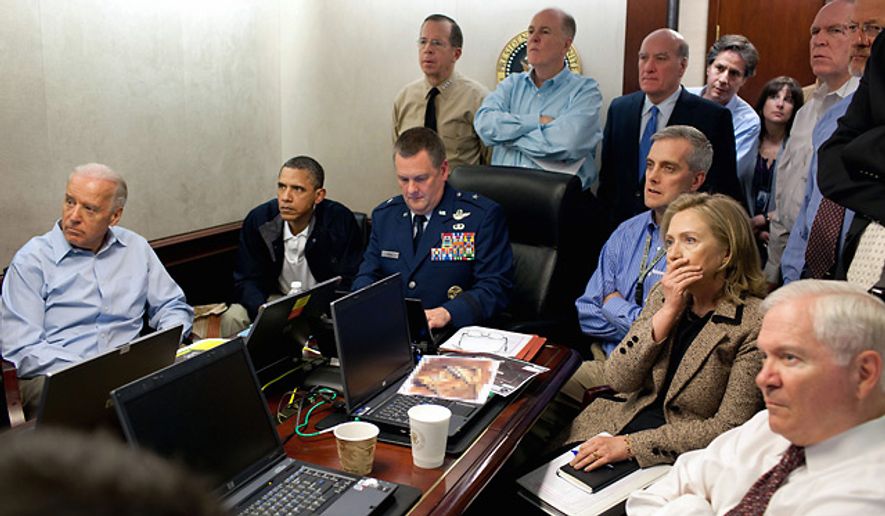Reports that the CIA in 2016 decided to extract a Kremlin agent out of Russia came after the Obama administration lost another key spy years earlier and badly misjudged the loyalties of an al Qaeda informant.
In 2011, after the raid that killed Osama bin Laden, Pakistan authorities quickly hunted down and jailed a Pakistani physician, Shakeel Afridi. At great risk, he had helped the CIA pin point the al Qaeda leader’s exact whereabouts in a compound in Abbottabad.
The CIA failed to exfiltrate him fast enough. He remains imprisoned today, eight years after the May 2 SEAL Team 6 raid. Some Republicans suggested a leak-happy administration betrayed him; the CIA flatly denied.
But there were excessive press leaks, complained former Defense Secretary Robert Gates.
Then-Vice President Joe Biden the next day identified the raiders as SEALs, after President Barack Obama refrained from doing so in a speech to the nation.
The White House began leaking so many details about the raid that Mr. Gates publicly told Obama aides to shut up. He said he thought he had garnered such a commitment. But within day the news media were publishing detailed graphics of the helicopter route and bin Laden compound. White House communication adviser Ben Rhodes promoted a movie idea.
Mr. Gates wrote in his memoir, “Duty.”
“Before we broke up and the president headed upstairs to tell the American people what had just happened, I reminded everyone that the techniques, tactics, and procedures the SEALs had used in the Bin Laden operation were used every night in Afghanistan and elsewhere in hunting down terrorists and other enemies. It was therefore essential that we agree not to release any operational details of the raid. That we killed him, I said, is all we needed to say. Everybody in that room agreed to keep mum on details. That commitment lasted about five hours. The initial leaks came from the White House and CIA. They just couldn’t wait to brag and to claim credit. The facts were often wrong, including details in the first press briefing. Nonetheless the information just kept pouring out. I was outraged and, at one point, told [National Security Adviser Thomas] Donilon, ’Why doesn’t everybody just shut up?’ To no avail.”
Months later, a helicopter carrying SEAL Team Six warriors in Afghanistan was shot down, killing all onboard.
“Never before had a president in office released the identity of any Special Forces Team involved in a covert operation,” the father of a slain service member told Congress. “Until bin Laden was taken out, no one had really heard of SEAL Team Six. Its name and missions were always kept quiet for protection for themselves and their families.”
The Pentagon contended that the mission wasn’t compromised.
In the current Russia spy narrative, the New York Times reported that the Obama administration became alarmed in 2016 for the spy’s safety. It had released a statement in October 2016 on Russian hacking Democratic Party computers. The Times said media inquiries at the time prompted the CIA to offer the informant extraction and a safe haven.
In 2017, the media leaks continued: the CIA had a source deep inside the Russian government. With that, the spy agreed to leave Russia.
The Obama administration also badly misjudged the motives of a supposed al Qaeda informant.
CIA officers welcomed Jordanian physician, Human Khalil Abu-Mulai al-Balawi, onto a CIA base in Afghanistan. One officer had baked him a cake. Al-Balawi went through three checkpoints unbothered. He detonated a suicide bomb killing seven American officers and contractors on Dec. 30, 2009.
• Rowan Scarborough can be reached at rscarborough@washingtontimes.com.




Please read our comment policy before commenting.